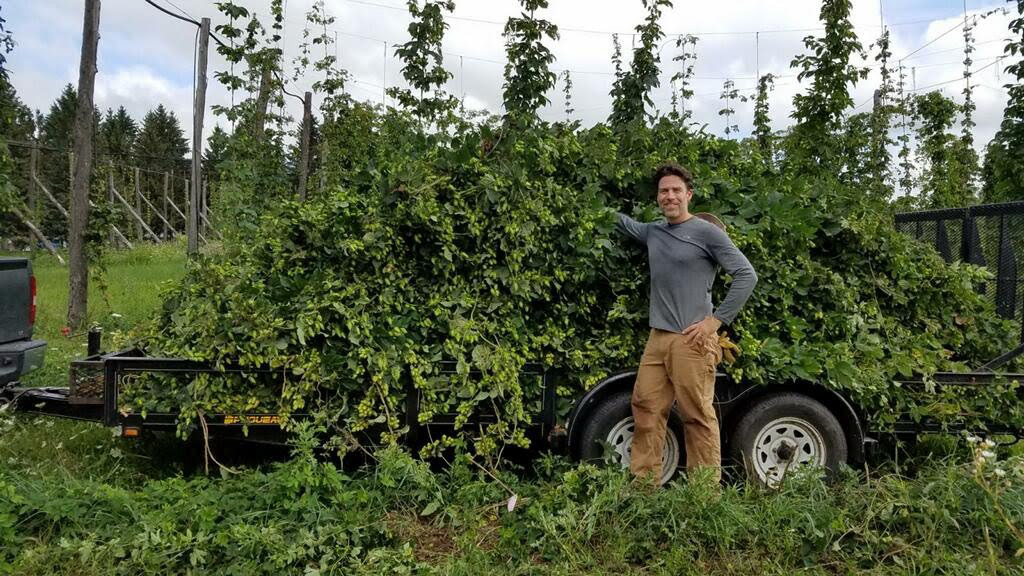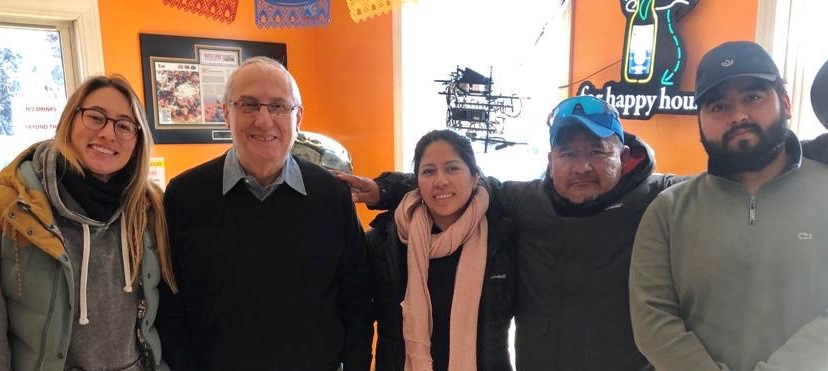Smart Farming Teams
Two Perspectives on the Benefit of Agricultural Labor and Farm Business Consulting
The Cornell Small Farms Program has nearly 20 years of experience supporting New York State farmers in their agricultural business pursuits from small-scale startup to long-term farming success. Throughout the years, our team has become increasingly aware of the importance of on-farm leadership, managerial, and human resource skillsets. On top of being systems and production experts, farm managers are responsible for overseeing complicated schedules and motivating work crews, while navigating regulations and overseeing increasingly complex procedures associated with the hiring process. Now more than ever, every farm business owner is keenly aware that labor readiness is critical in the work of supporting both farmer owner and farm employees in their efforts to increase on-farm efficiency and boost business resilience. Below, we share two opinion essays from participants of the Smart Farming Team (SFT) initiative, an aspect of the Small Farms Program’s Labor Ready Project.
The Smart Farming Team (SFT) initiative connected farm business owners with local agricultural consultants with the goal of increasing farm business efficiency through labor management and human resource skill building. Representing fourteen different counties throughout New York State, 17 separate farms and 10 individual agricultural consultants participated in the project. Building upon lessons learned from previous projects, the SFT initiative launched in late 2018 and focused specifically on technical assistance for:
- hiring employees.
- onboarding and training.
- improving the work environment.
- assessing the business for H2A program readiness.
The SFT cohort of business owner participants represented a wide range of farm sizes and farming operations. From an 8-acre vineyard in the capital region, to a 7,000-acre row crop operation near Lake Ontario, the SFT project is a true testament to the growing awareness of increasing on-farm efficiency through human resource knowledge attainment. The following essays, submitted by SFT participants, represent both project perspectives, one from a farm business owner and the other from an agricultural consultant. Their accounts demonstrate both the significance of increasing labor and business management skillsets among farm owners, as well as the inherent power of skill sharing, networking, and teamwork within the agricultural community.
Chad Meigs – Farm Business Owner – The Bineyard

Smart Farming Team participant and Bineyard owner Chad Meigs poses with a beautiful hop harvest.
Courtesy of Chad Meigs
Recently I was blessed with acceptance into the Smart Farming Team project, which is a grant put on by the fine folks at the Cornell Small Farms Program. As a beginning farmer, the SFT project really helped me understand what it means to be a farmer, as well as how to run a profitable farm business. As a backdrop to this story, my professional experience is in computer science. I have recently gotten away from computer and picked up a spade to start a hop farm. I knew starting a farm would be hard work, especially without any background or experience in farming, but what I really did not have a grasp on was, how hard running a farm business would be. There is more to farming than just planting and harvesting; it is running a business, doing finances, becoming your own marketing/sales team, and lots of exercises in human resources sprinkled in as well. The Smart Farming Team project has enabled me to get a better handle on managing my hop farm, a commodity considered “non-traditional” in our area of Central NY with few local resources to access.
When accepted into the Smart Farming Team project, I knew what I was looking for to improve the labor management of my business, but I did not know how to go about the process. After six years in the hop business, I needed to scale up. In order to scale up, I needed help with labor. If I know how to run my business and grow hops effectively, I can make a profit, but in order to scale up; I needed additional labor.
Labor has always been the bane of my farms existence. I have been very lucky with some of my hires, but with others, not so much. After chatting with many other farms in my area, I figured I wanted to try the H2A Visa program. From what I had heard, hiring guest workers was both costly and complicated, but having a reliable and quality workforce was well worth the peach of mind. When I first started looking into the H2A program and how to apply, it was quite overwhelming, tons of rules and regulations, lots of restrictions, and financial commitments even before a worker could set foot onto the farm. I needed help navigating this landscape.
Enter Smart Farming Team project. The project staff paired me with an Ag business consultant, who helped me create a tailored solution to my labor shortage and a pathway forward. The goal of our project was twofold; the first objective was to assess the readiness of my business for the H2A Visa program. Next, we created a standard operating procedure (or documented business process) to help guide me through the annual H2A application process going forward. Working with the consultant, we set a timeline of goals and milestones and by the end of the program, I knew exactly what I needed to do and had a network of knowledgeable people to help me get there.
As I write this article, we are amidst the global COVID-19 pandemic. Due to being a first-time applicant, global travel restrictions, and the fear of spreading the disease, our workers were denied access into the country. As a farmer, I can expect setbacks and I did have a fallback plan, so luckily our farm is still in a good place. After a last-minute scramble, we were able to hire to cover a portion of the labor truly needed for the season. Although, we are still behind in terms of where I would prefer to be, we manage to get the job done. However, I still hold out hope that we will be able to get the H2A Visa workers in time for harvest. Once again, I am only considering this a minor setback because next season I will be prepared. We will give this another shot and I have a process to follow, as well as a network of people to help me along the way. Many thanks to the Cornell Small Farms Program and specifically, the Smart Farming Team project!
Chad Meigs is founder and chief Hoperations officer at The Bineyard, a full scale hop farm and processing facility located in Cazenovia, NY. The company is one of a few full-service hop enterprises in the State of NY. The Bineyard includes end-to-end processing equipment and support facilities to produce high-grade hop products utilized by craft breweries throughout the state. Mr. Meigs currently serves on the Board of Hop Growers of New York an organization that has been in the forefront of resurrecting the hop industry in NYS and the Northeast. Through his hop industry visibility and stewardship, Chad has developed a far-reaching network in the craft beer industry.
Miguel Saviroff – Agricultural Business Consultant

The Rosario Family Smart Farming Team (Sergio Jr, Sergio, and Silvia), Miguel Saviroff, and Nicole Waters) sharing lunch after a hard day’s work.
Courtesy of Jamie Johnson / Cornell Small Farms Program
Miguel consulted with two separate Smart Farming Teams throughout the project and responded to the following questions regarding his experience.
What were the goals of your Smart Farming Team projects? What was the most valuable aspect of each project for you? For the participants?
The goals for both producers aligned with incentivizing them to study farm management practices and appreciate the skills of modern farm managers. The goals included improving their decision-making processes and overall data collection skillsets to create financial statements for farm business analysis.
The specific goals for Sergio and Silvia (SFT #1) were assistance with creating a business plan and the creation of an enterprise budget for a 30-Acre plot containing six different apple varieties. For Vilo (SFT #2) the goals were to assist him with understanding farm business and management concepts, with emphasis on enterprise budgeting to improve planning for an 8-acre orchard of EverCrisp and Snapdragon varietals. We set an additional goal to create a glossary of farm business management terms (in both English and Spanish).
Consulting for Hispanic producers for the SFT project was a delight; even though the principles of financial management are universal, we were able to analyze business from cultural perspectives as well. I feel rewarded that their lives have improved because of our teamwork on this project. In the case of Sergio and Silvia, the most valuable aspect of the project was to assist them with the creation of a plan, thus building the confidence to proceed with orchard expansion. With their financial plan in hand, they were able to approach their lending organization with detailed projections and a clear path to achieve their goals. For them, gaining an understanding of financial statements has been paramount. Silvia reminisced about an experience with a pesticide supplier, who asked her for a balance sheet to approve a loan. “Had he asked me for it last year, I wouldn’t have known what he was talking about.” After providing the balance sheet to the supplier, she started receiving the inputs.
The approach with Vilo was different. The most valuable aspect of this project was the ability to shift his point of view, allowing his train of thought to divert from the day-to-day farm tasks and gain the perspective necessary to analyze the farm as a business. The use of materials in Spanish on acquiring and organizing management information was a huge starting point. As he noted, “being able to organize and plan systematically on a paper, changed my perspective because historically that was information that I carried only in my head.”
What long term benefit to you anticipate for the farmer participants, and other farmers who could participate in the future?
Increased knowledge and farm management skills such as business planning, recordkeeping, and financial management will lead to future increases in production, labor efficiency, profitability, and market opportunities.
The adoption of enterprise analysis will allow for future expansions of their farm operations through new alternative enterprises. They will be able to make sound business decisions and be able to negotiate from an integrated perspective, while keeping farm business process orderly and organized.
Overall, I foresee a better quality of life not only for these farmers and their families but also for the farm employees working for their businesses, as well as the entire rural communities their businesses support. The tools they learned will allow them to think, communicate, and make clear and professional business decisions.
Miguel is a native of Venezuela, raised in a rural, sugar cane production area. After receiving a scholarship that took him to a region in Northern California known for cultivating almonds and rice, he stayed to pursue a B.S. in Agriculture at California State University – Chico. The advanced technological level of Ag production in the region solidified his interest in on-farm profitability and the significance of farm owner knowledge in farm financial management. He found Cooperative Extension to be a path to practicing his multi-disciplinary profession while enjoying the outdoors. After returning to Venezuela as an extension educator for 5 years, he returned to the U.S. to obtain a Master’s degree in Ag Economics at Ohio State University. He eventually settled in Pennsylvania, working for 17 years for the Penn State University Extension system, as a farm financial management extension educator. In retirement, he still finds working with farmers extremely rewarding, “I love their way of thinking and passion for their job; it is contagious and motivational.”
For more information about the Labor Ready project, visit smallfarms.cornell.edu/projects/labor-ready/.

